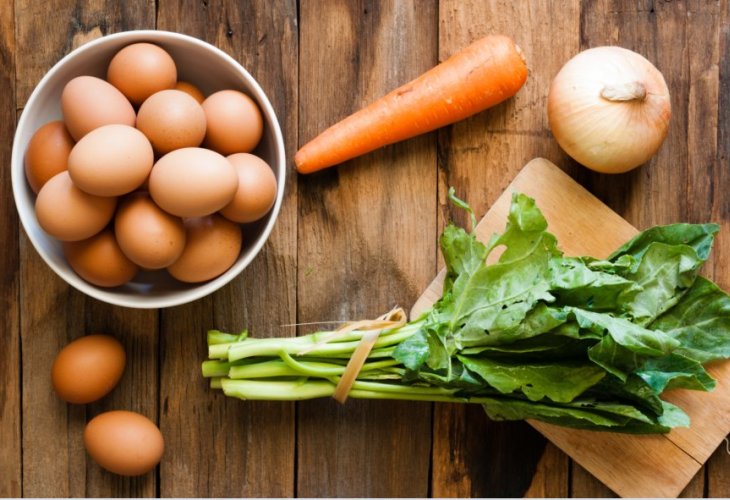Health and Mind
Legumes, Eggs, and Vegetables: Nutritious Choices Across Food Groups
Explore better food choices for energy, clarity, and long-term health, inspired by Jewish values and mindful nutrition
 (Photo: shutterstock)
(Photo: shutterstock)Which drinks are healthiest? How can you sweeten food naturally? And what treats are okay in moderation? Here’s a helpful, Torah-conscious guide.
Vegetables: Cleanse and Nourish
Green vegetables are especially good for cleaning out the digestive system and supporting liver function. Try to include plenty of fresh greens like lettuce, cabbage, and a variety of leafy vegetables in your daily meals.
Fruits: Natural Sweetness
Among fruits, apples and pears are recommended as great choices even for those managing diabetes. They’re nourishing, gentle on the body, and easy to digest.
Dried Fruits: Healthy in Moderation
For a healthy, sweet snack, unsweetened dried fruits like cranberries and dates are good options. Just be sure they don’t contain added sugar.
Grains: Whole and Natural
Choose whole, nourishing grains like barley flour, rye flour, spelt flour, groats (coarsely ground grain), basmati rice (preferably brown or whole), quinoa, and buckwheat. These are less processed and more filling. If you’re looking for healthier bread, go for sourdough made from spelt, rye, or barley without yeast or added sugar.
Legumes: Protein from the Earth
Lentils, tofu, mung beans, fava beans, chickpeas, and other legumes are excellent plant-based sources of protein and fiber. They’re satisfying and versatile in many dishes.
Oils and Fats: Healthy and Natural
Good fats are essential, and natural sources are best. Include nuts like walnuts, pecans, Brazil nuts, and skinned almonds, along with seeds like pumpkin and sunflower. Avocados are also a great source of healthy fat. For cooking, use cold-pressed extra virgin olive oil or sesame oil. Avoid refined oils, which are heavily processed and better suited for machinery than human digestion.
Eggs: A Powerful Food When Prepared Right
Organic eggs are best. Try eating them as soft-boiled or in a lightly cooked omelet. Eggs can even help those dealing with high cholesterol when eaten the right way.
Fish: Go Deep
When it comes to fish, deep-sea varieties like salmon and halibut are preferred. They generally contain fewer toxins compared to farmed or pond-raised fish.
Drinks: Hydration with Purpose
Stay well-hydrated with herbal teas and clean water. Filtered water, especially from a reverse osmosis system or mineral water is best. These options help the body flush out toxins and stay energized.
Natural Sweeteners: Better Ways to Enjoy Sweetness
If you’re looking for a healthier way to sweeten your food, consider natural cane sugar, pure date syrup (also called silan), or pure stevia (without artificial additives like saccharin). These options are less processed and easier on the body.
Dairy: Choose Carefully
While there is ongoing debate about dairy, if you do include it in your diet, go for butter and goat yogurt in small amounts. There’s no need to fear natural butter fat but steer clear of margarine, which contains harmful trans fats.
Meat and Poultry: With Caution and Care
When eating meat or chicken, choose products with reliable kosher supervision. Fresh poultry and meat from private, carefully supervised shechitah (ritual slaughter) is ideal. Eat these foods in moderation and balance them with plenty of vegetables and grains.
Coffee: Less Is More
If you enjoy coffee, black coffee is the better choice. Still, it’s best to have it in moderation, as too much caffeine may weaken the bones by pulling out calcium. A good alternative is a roasted barley drink (called café d’orzo or barley coffee), often found in natural food stores.
Sweets: Treats in Moderation
Some sweet snacks can be enjoyed occasionally, but it’s important to keep them minimal. Safer choices include popcorn, potato chips (with minimal ingredients), bran flakes, dark chocolate, health bars from trusted health stores, and popsicles made from 50% real fruit. Be sure to read ingredient labels and avoid products with artificial preservatives, colors, or additives.
A Final Thought
In Judaism, taking care of our body is part of serving Hashem. Every food choice can bring us closer to a life of balance and clarity physically, emotionally, and spiritually. When we eat with mindfulness and gratitude, even the smallest choices can become part of our avodat Hashem (service of God).

